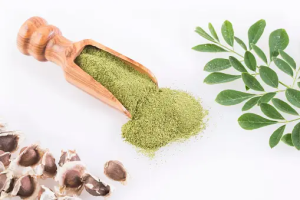We continuously study the science underlying food and its evolution in our field of work. In all honesty, the gifts of nature have stayed the same since the beginning of time.
However, as technology advances, scientists are increasingly delving deeply into safer investigations into the nutritional advantages of fruits, vegetables, nuts, seeds, and herbs. Moringa is one such plant that keeps drawing attention from people in scientific journals.
In this post, we will explore the health benefits that moringa offers and why you should include this superfood in your diet.
What is a Moringa?
In certain regions of the world, moringa is a significant food source. It is inexpensive and simple to grow, and when dried, it keeps most of its nutritious content. It appears to aid in shielding cells from harm because it is an antioxidant. Moringa may also aid in reducing pain and inflammation.
Many other uses of moringa include diabetes, asthma, and breastfeeding; however, these claims are not well-supported by scientific research.
Traditional Use of Moringa
The majority of the time, leaves are consumed raw, boiled, steamed, or roasted in different cultures. They are also utilized in the making of tea, which is a traditional drink to ward off illness and promote wellness.
Traditional medical professionals utilize the leaves or powder to treat fever, diarrhea, erectile dysfunction, headaches, anemia, skin irritations, and inflammation. In order to assist in fighting malnutrition or inadequate nutrition, it is also included in meals.
The most popular form is powdered, which is made by drying and grinding the leaves to maintain their quality and ease of application.
Its high zeatin content makes it more resilient for storage and transit by preventing the leaves’ ability to lose their therapeutic properties due to the breakdown of chlorophyll.

8 Benefits of Moringa
Here are some benefits of taking moringa:
1. Rich in Calcium
It helps moms who are nursing their babies. It can increase lactation and enhance the quality of breast milk by giving the infant a lot of calcium.
2. Help Alleviate Diarrhea and Reduce Fevers
Try drinking moringa tea the next time you have a fever that won’t go down or a severe attack of the runs. To prepare a cup of hot water, simply steep a bag of moringa leaves in it. Moreover, moringa powder and tablets are available anywhere.
If you are lucky enough, there may be a growing moringa tree in your backyard, or you can shop for moringa powder in your nearest grocery store.
3. Prevent Fatty Livers
Moringa is extremely beneficial for liver health. Patients with cancer might consider it because intense treatment can harm their livers. Additionally effective for treating cirrhosis and fatty livers brought on by alcohol is moringa. It is excellent for protecting kidneys as well.
However, as previously mentioned, it must be used under a healthcare professional’s guidance to ensure it doesn’t conflict with any prescriptions or diseases you may be experiencing.
4. Beneficial for Persons Who Have Thyroid
Both hypothyroidism and hyperthyroidism can benefit from it. But once more, always monitor your levels if you are on medication for thyroid issues.
It is not desirable for moringa and your prescription to act quickly and cause such drastic changes in your levels that you end up with a new issue. Always make an informed choice while being monitored by a physician.
5. Promotes Wound Healing
People still bandage wounds in villages with moringa leaves. For relief from insect bites, you can also combine moringa oil with a carrier oil, such as coconut or sesame.
6. Beneficial to the Nervous System
The application of moringa leaves has been shown to be beneficial for a variety of nerve illnesses. They function as neuroenhancers and promote brain health. The high content of vitamins C and E helps to prevent neuronal degeneration and enhance brain activity.
7. Handling Diabetes
Moringa leaf extracts have potential benefits for diabetics, including lowering blood sugar and insulin levels and preventing organ damage. Its characteristics may aid in avoiding complications and delaying the course of illness.
8. Kidney Stone Prevention
Consuming moringa is advised by specific traditional therapies as a way to avoid kidney stones. Empirical research has demonstrated that moringa extracts may prevent mineral accumulation, otherwise leading to kidney stones.
Final Thoughts
Moringa, often hailed as a superfood, offers an impressive array of health benefits. Its rich nutritional profile, packed with vitamins, minerals, and antioxidants, makes it a valuable addition to any diet.
Whether you choose to incorporate moringa in smoothies, salads, or as a supplement, you’re taking a significant step towards better health and vitality.
Ready to transform your wellness journey? Start incorporating moringa into your daily routine today and feel the remarkable difference!
Birthdays are special occasions cherished by everyone. Sending birthday wishes in Marathi can make the day even more memorable. Unique ways to send these wishes add a personal touch. They show thoughtfulness and creativity, making the recipient feel truly special.
